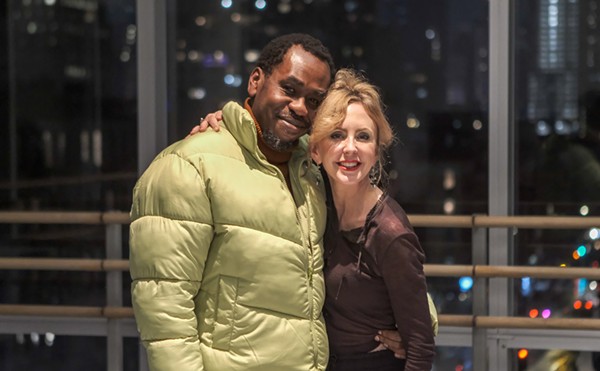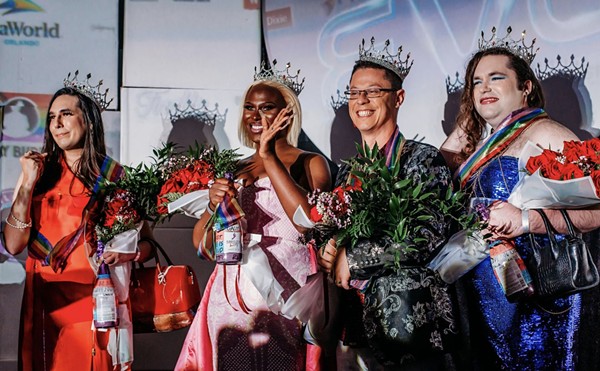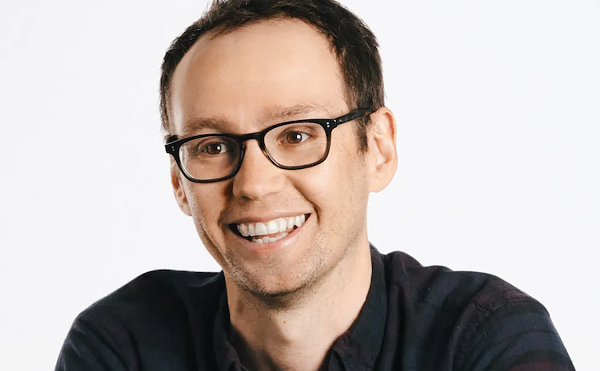On the Orlando cultural calendar, the phrase "first annual" usually and unfortunately translates into "never to be repeated." But when the Central Florida Jewish Film Festival enters its sophomore year Sunday and Monday, Oct. 29 and 30, at Maitland's Enzian Theater, its virtues won't be limited to rule-defying survival.
The sequel to last October's inaugural collaboration between the Enzian and the Jewish Community Center of Central Florida is a testament to the idea that diversity equals longevity. Within the two-day screening period, the festival's audience will witness huge leaps in style and content: The four scheduled features (and one short) are as disparate as "niche" programming can get. The focus on variety all but ensures wider appeal to the community at large; as a side product, it puts the lie to the notion that the Jewish film genre starts and ends with Holocaust documentaries. (Sorry, Oscar voters.)
According to Larry Haber, chairman of the JCC's film-festival committee, the divide-and-conquer stratagem is bearing healthy fruit. Ticket sales, he reports, are doing "just as well, if not better" than in 1999 -- when sold-out houses were the rule, not the exception.
"We talked long and hard about theming [the program]," Haber says, "and we said, 'No, we're just going to pick the best films we can find.' There are wonderful films being made that people otherwise wouldn't get to see. If we can get good product that also happens to have a message, that's even better."
Israeli director Amos Gitaï's 1999 drama, "Kadosh" -- lauded by Haber as "the crown of what we've got" -- neatly fulfills both wishes. An unsparing portrait of the women who suffer under the constraints of Jerusalem's Orthodox Mea She'arim community, the film views emotional repression with an almost clinical solemnity. To sisters Rivka (Yaël Abecassis) and Malka (Meital Barda), Mea She'arim is a stifling, potentially fatal environment, a meager menu of the same narrow options Tracy Chapman once set to music: "Leave tonight or live and die this way."
To avoid offending the neighborhood's ultra-Orthodox population -- and to protect his actors from possible pressure -- Gitaï instead shot most of his footage in a Tel Aviv garage. Still, he received the cold shoulder from Israel's Quality Film Encouragement Fund, which reportedly refused to support the production. The response was better in France, where "Kadosh" became the first Israeli film in 25 years to be screened as part of the main competition at the Cannes Film Festival.
That landmark status aside, it's a daring move on the JCC's part to spotlight a celluloid manifesto that fearlessly shakes the branches of their own family tree. But Haber isn't worried that "Kadosh" will incur the wrath of the hyper-conservative -- as the brilliant "My Son Fanatic" did at the 1999 South Asian Film Festival, when Muslim viewers who were incensed with the onscreen depiction of their faith as, well, fanatical walked out of the Enzian en masse.
"The context is different," Haber believes, citing "Kadosh's" focus on personal, not political, unrest. Still, the film's themes of religious rigidity "are tremendously important with what's going on in the Middle East right now," he says. "I think it's important for people to understand that mind set."
Though "Kadosh" inhabits a milieu of unwavering tradition and gender inequity, director Julie Shles hones in on an utterly different Israel in her "Pick a Card," a 1997 comedy/drama set in Tel Aviv. Instantly coarse humor announces that this tale of an amateur magician's (Zvika Hadar) rise and fall is steeped in modernity.
And for proof that opportunities for women are rife in today's Holy Land, look no further than the film's casting: Though Hadar's David is ostensibly the star, the real revelation is the performance of Esti Zackheim as his long-suffering girlfriend, Batya. An actress whose plus-size body type may explain the curious description of her portrayal as "outstanding in a surprising way" in the film's press notes, Zackheim is a pure wonder, possessed of a radiant magic that caresses, then breaks, the heart. Would she ever be allowed to shine as a romantic lead in a production lensed on our supposedly liberal shores? Not in one million years.
The festival's oldest (and only black-and-white) feature is "The Plot Against Harry," a revival of American writer/director Michael Roemer's crime comedy about a New York City gangster's half-hearted, disastrous attempts to go legit. Shot in 1969, the film languished unreleased on Roemer's shelf for 20 years, finally enjoying a well-received theatrical run in 1989 (including a brief engagement at Enzian).
To Haber, "Harry" simultaneously offers "a look at what 1969 looked like" and "a good commentary on Jewish life in the United States." Indeed, as the sleazy-but-beleaguered Harry Plotnick (Martin Priest) endures the brickbats of his immediate family while weathering a life-threatening illness, he appears to embody the favorite, room-silencing threat of the Jewish mother: "You'll all be happier when I'm dead."
Priest is extremely funny in his sad-sack schtick, but be forewarned: The film shuttles rapidly from location to location, hardly pausing to establish one character's relation to another. Perhaps all of Roemer's transition shots were lost in the two-decade shuffle.
To offset its short (81 minutes) running time, "Harry" is paired on the festival's program with "Village of Idiots," a cute animated short that retells a Yiddish folk tale set in a society of lovable dolts. But "Village" has more in common with "Train of Life," a 1998 French-language fantasy by exiled Romanian director Radu Mihaileanu. In the dark days of World War II, the Jewish residents of an Eastern European village hit on a master plan for escaping the approaching Nazis: They create their own deportation train, electing some of their number to pose as German wardens on a clandestine voyage to Palestine.
Their journey is Mihaileanu's cue to pile on the social satire by letting the train become a microcosm of the war itself. Along the way, some of the villagers unexpectedly embrace communism; meanwhile, the Nazi stand-ins find themselves seduced by their new "authority" and exhibiting an increased devotion to efficiency. They're shunned by their former neighbors as completely as if they were the genuine article.
Neither do the sons and daughters of Abraham go unsinged. Though the procurement of a train is essential to the villagers' survival, locating one at a reasonable price is granted nearly equal importance. While the film's surface similarities to "Life Is Beautiful" and "Jakob the Liar" put it in the realm of the "lighthearted Holocaust film" -- a phrase Haber understandably has difficulty repeating without shuddering -- its resolute political incorrectness makes it just as much the "Blazing Saddles" of Jewish cinema.
What is "Jewish cinema," anyway? The festival is less concerned with defining the term than offering two days of entertaining viewing that will appeal to followers of the faith and non-Jews alike.
"The film festival is really for the whole community," Haber says, "everyone that's interested in art films or alternative types of films.
"If you've seen one Hollywood movie lately, you've seen them all," he dismisses -- including the mainstream motion-picture industry's few Jewish-themed projects, which Haber (an entertainment lawyer by trade) considers just as predictable and monochromatic.
In the coming years, the JCC hopes to expand the festival to a more involved affair. Enlisting more guest speakers is also a priority. Film historian Murray Glass filled that role last time, but this year's schedule is made up solely of screenings. For now, that's good enough.
"These [films] make sense for us," Haber says. "I think more people might be willing to give it a chance."

















